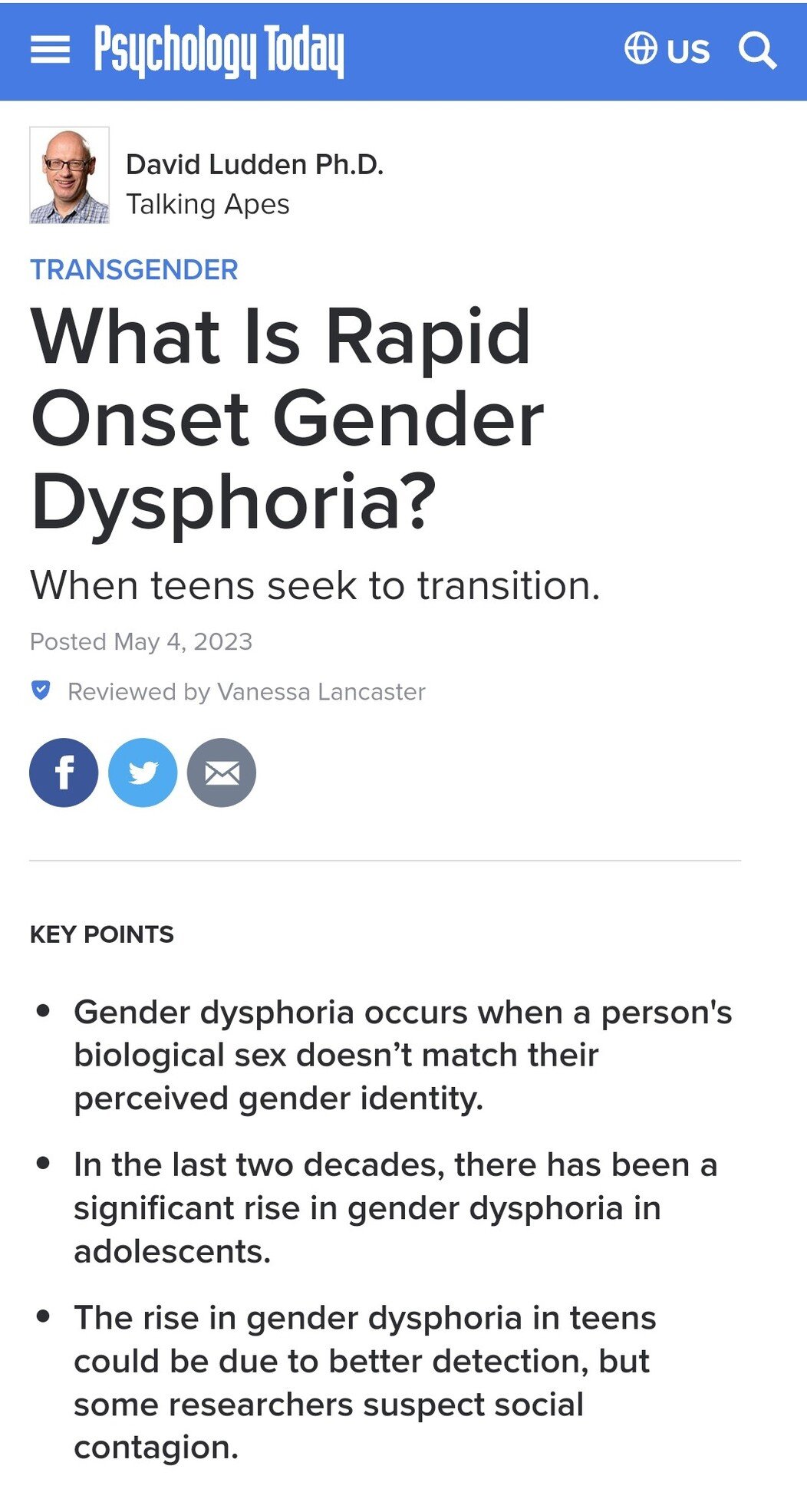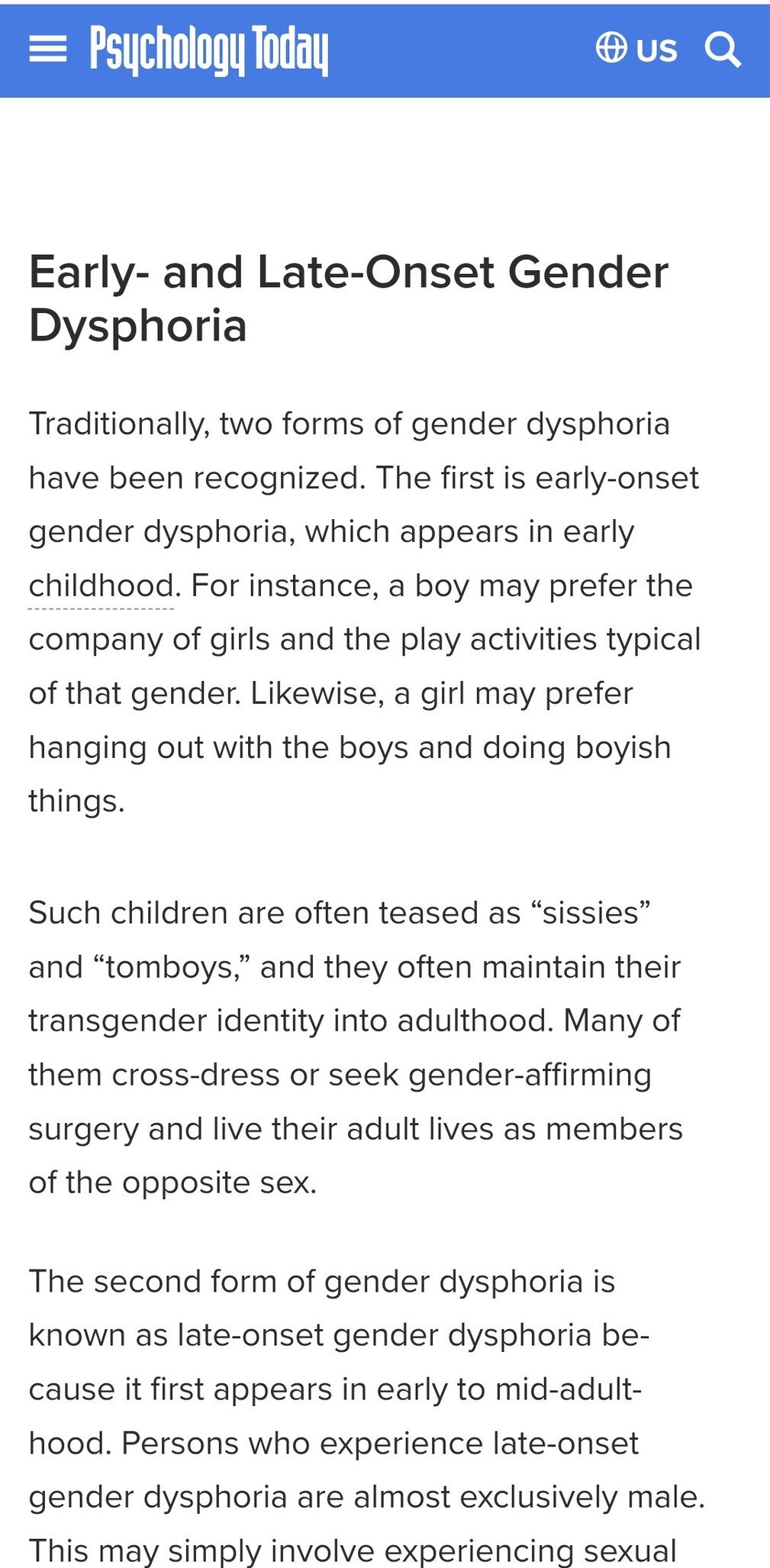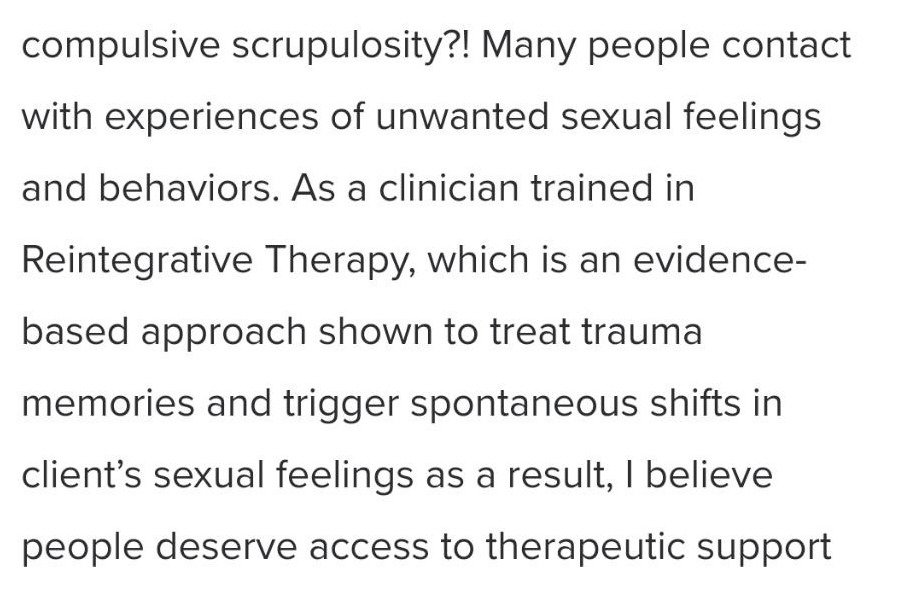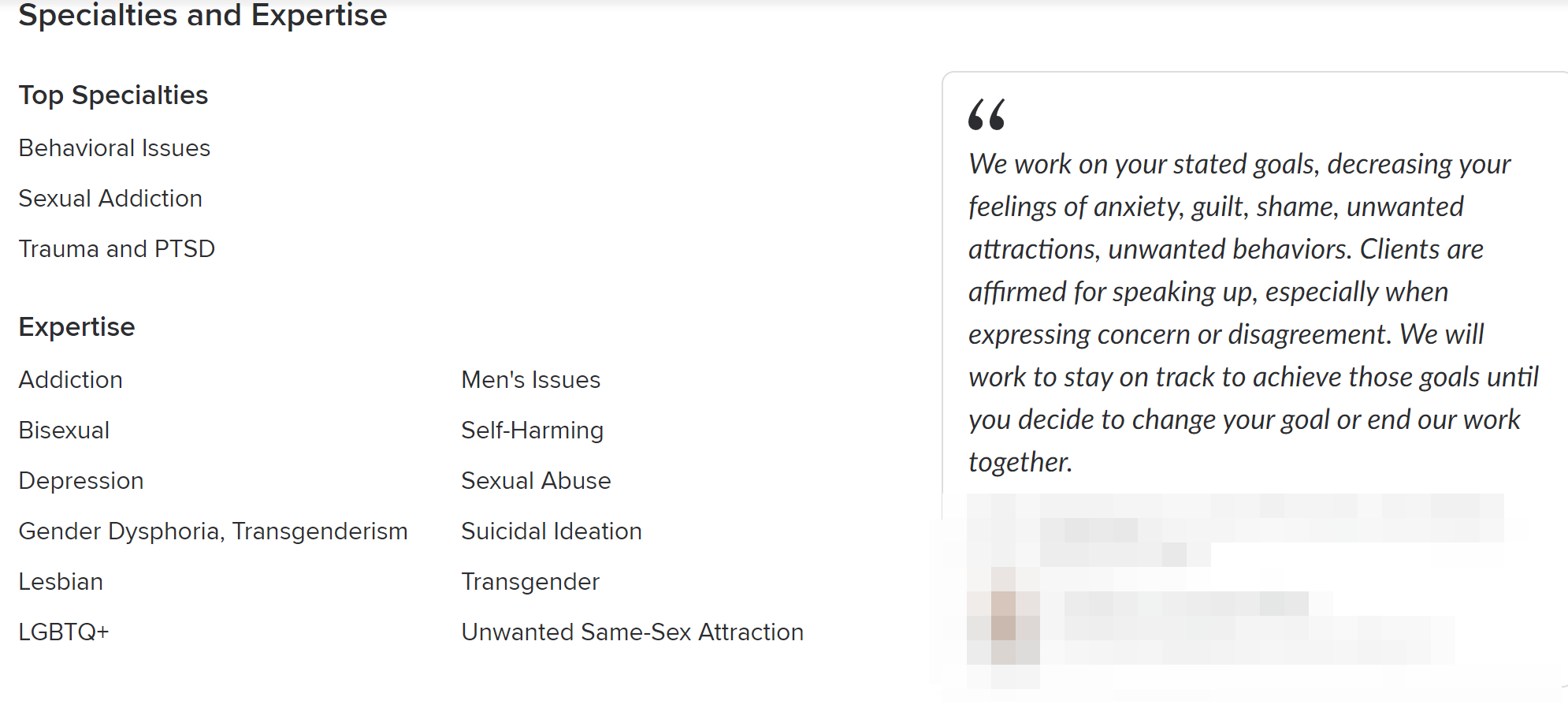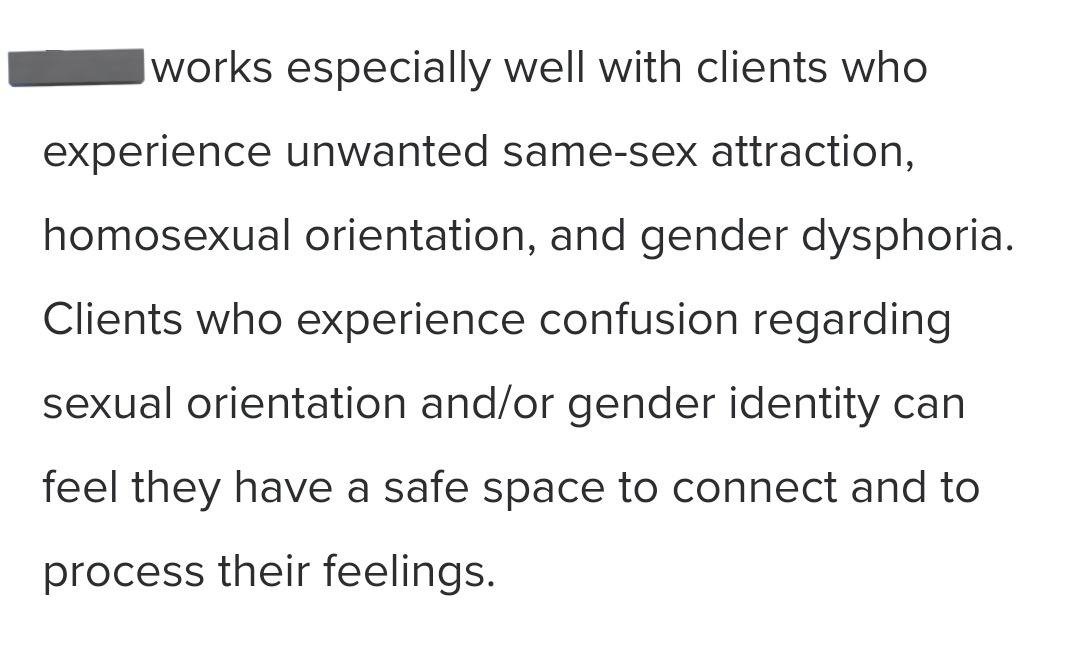Psychology Today’s conversion therapy problem
Anyone who has ever asked me for a therapist recommendation knows that I see Psychology Today as a plight upon the landscape of behavioral health. While at face it comes across as simply a giant blog for badly-written opinion articles, it has a much darker side than just vapid posts on “hook-up culture” and whatever some junior Jordan Peterson sees as an immutable psychological difference between men and women. Psychology today is actually host to an extraordinary number of conversion therapists.
If you’re familiar with the history of conversion therapy in the United States, skim down farther ahead. If not, first it helps to know a little bit about the conversion therapy ecosystem. In 1992, religiously-motivated conversion therapist Joseph Nicolosi [1] founded the National Association for Research and Therapy of Homosexuality. NARTH provided a “clinical” hub for the ex-gay movement, and was a melting pot of pseudoscience; blending old school psychoanalytic ideas with evangelical pastoral counseling.
When people accused them of being too religious, they touted their generally specious academic credentials. When those credentials were rightfully challenged, they claimed religious liberty and appealed to first amendment protection in court. But while NARTH was never a major player in the world of medicine, mental health, and counseling, it had a massive influence on the evangelical political approach to fighting conversion therapy bans and opposing LGBT rights.
Psychology Today is also host to a disturbing number of very suspicious articles with poor quality and/or outright misinformation about LGBTQ+ topics.
In 2014, after realizing they’d fundamentally failed to convince the public that they were anything other than ardent homophobes, and that science had long since moved on to realize that being gay is not only non-pathological, but a natural (and awesome) part of human diversity, NARTH rebranded under the Association for Therapeutic Choice and Scientific Integrity. Like so much of the anti-LGBT, pronatalist far-right, ACTSI refocused on transgender people as part of a political strategy shift to “separating the T from LGBT”. Long before groups like LGB Alliance ever started hawking bumper stickers about it, this was a Heritage Foundation and Family Research Council strategic plan (Kant & Boskey, 2022).
During this time, “therapeutic choice”— the argument that all people have a right to pursue a type of treatment no matter how dangerous and ascientific it is— was extended to the right of parents to “direct the moral upbringing of children” and by extension, to bring them to dubiously credentialed anti-trans conversion therapists and call it therapeutic choice, a far more secular-sounding term than the "religious freedom” argument of the 2000’s.
One of the pivotal strategies during the early days of NARTH, was to focus on the specific language of “same-sex attraction”. This used similar logic but had a wildly different motivation to the idea of replacing the phrase “gay men” to “men who have sex with men” in the 1990’s. The focus on SSA was to separate feelings from identity, whereas in public health, “MSM” was designed to disentangle identity from behavior to provide a more inclusive term. Conversion Therapists wanted to inculcate the public with the idea that SSA was a test of one’s moral or religious convictions, but not a part of a person’s innate sexuality. In fact, practitioners often reject the idea of sexuality altogether, seeing heterosexuality as inseparable from marriage and the family and the natural, only acceptable human experience of sex.
The focus on SSA was a continuation of the movement to preserve ego-dystonic homosexuality as a mental illness in the DSM. This linguistic shift was picked up aggressively by the deceptively named American College of Pediatricians, not to be confused with the real professional organization the American Academy of Pediatrics. ACPeds began to pump these ideas into family medicine and pediatrician offices using money from the Heritage Foundation and later, the Alliance Defending Freedom, which played a critical role in overturning Roe v. Wade through Dobbs v. Jackson.
So what does all this have to do with Psychology Today?
A cursory search of Google’s index of the site shows an alarmingly high rate of results for SSA. In fact, when searching specifically for therapists in all countries (hence the wildcard * in the URL naming convention), and specifying “sexual brokenness”, a term that comes from evangelical Christianity to describe having normal sexual feelings, you get 1,300 results, the overwhelming majority of which are in the United States. Among these results includes Joseph Nicolosi’s son, who has rebranded his father’s “reparative therapy” model to obscure its origins.
James Phelan is also listed on psychology today. Phelan was one of three who helped draft NARTH’s official objection to the American Psychological Association’s 2009 stance against conversion therapy, and objecting to the statement that gay people were equally capable parents. David Pickup [2], an LMFT who deals exclusively in the empirically disproven notion that “same sex attraction” is the result of trauma and sexual abuse, is also listed on Psychology today. Pickup has the distinction of being one of the more prolific purveyors of alleged “expert” testimony on behalf of states like Florida and his home state of Texas. Read his testimony against the conversion therapy ban in Vermont here.
Not only is Pickup listed on Psychology Today, he is listed as “verified”.
In the transcript of Pickup at the God’s Voice conference, he gives a workshop on conversion therapy and overturning conversion therapy bans, as well as his particular brand of homophobic quackery that posits all LGBT identity comes from trauma, specifically that male homosexuality is the product of childhood sexual abuse. Listen at your own peril though, it’s bad, which is why I made an AI listen to it for me and then redacted the part where the emcee refers to him as a “remarkable man” because I’d rather eat gravel than have that statement appear on my blog, even embedded.
Perhaps just as disturbingly, Psychology Today is also host to a range of “Gender Exploratory Therapists” like Lisa Marchiano, the original author of “Outbreak: On Transgender Teens and Psychic Epidemics”, which argues that the apparent rise in transgender youth is due to what Jungian psychoanalysts refer to as the “collective unconscious”.
Marchiano is joined by Sasha Ayad, another prominent anti-trans therapist and co-host of A Wider Lens Podcast where they feature far-right pundits and disguise it as a free-wheeling discussion of edgy science. To understand the ecosystem of anti-trans conversion therapists operating out in the open, I would encourage everyone to check out this incredible resource put out by the superheroes at Health Liberation Now!
At roughly the same time, then-professor at Brown University School of Public Health, Lisa Littman, published survey results from a cross-sectional convenience sample of non-affirming parents, recruited by anti-trans websites that purported to show what Marchiano and Littman called Rapid Onset Gender Dysphoria (read more from Zinnia Jones at genderanalysis.net).
Below is a google sheet I’ve started to track the number of results for key dogwhistles on Psych Today.
While some of these are “false positives” and reflect poor word choice, the overwhelming majority of them are not. This is exacerbated and made quite dangerous by the the inexplicable policy of Psychology Today to allow providers to profess expertise with zero evidence to support such a claim.
Unlike sites like Zencare, Psychology Today has no required vetting, or even a requirement that one be licensed to practice. Payment for a membership is enough, and the statement that one is “verified” by Psychology Today merely means that the provider paid to have their license verified; it means nothing about their practice. By contrast, before I could be listed on Zencare, I had to do a 1:1 interview with a fellow clinician to review how I would work with and address each of the items I’d listed as areas of expertise. As I’d listed expertise in anxiety disorders, I had to give an extemporaneous overview of Exposure Therapy, as well as an explanation for the subtle difference between the terms Exposure Therapy and Exposure and Response Prevention Therapy. More to the point, because I’d listed myself as having expertise in working with trans clients, I rightfully had to explain what that looked like and how I position myself as a provider of gender-affirming care. This is how it should be.
Psychology Today has a history of this practice. In 2015, the Human Rights Campaign sent an open letter to the company about paid advertisements for conversion therapy that were running on their website, this was followed by a formal letter from HRC’s legal counsel outlining the problem. Among the problems outlined by counsel was the profile of Thomas Schmierer. At first, Psychology Today openly refused to remove the ads. Two days later, they succumbed and claimed they had fixed the problem. His profile is still up, although the explicit language has been removed.
content warning : the following audio and transcript is extremely disturbing and full of dangerous innacurate clinical misinformation.
Screenshot of transcript of Psychology Today “verified” therapist David Pickup.
note: “summary keywords” are generated automatically by the otter AI.
What is “Reparative Therapy”?
Created by Joseph Nicolosi as a launching point for NARTH, Reparative Therapy is a pseudo-science idea that all homosexuality is created by trauma, either in the literal or abstract sense. Nicolosi believed that there was a psychic wound created in a client’s life (his focus was almost exclusively men) that left them feeling emasculated in some way. Nicolosi claimed that homosexuality was an attempt by the person to fill that void. While objectively wrong, it’s not dissimilar to Freud’s repetition compulsion.
Nicolosi believed ardently that “same-sex attraction” was a psychiatric disorder, and through a hodgepodge of Christian counseling, tough love, psychoanalysis and behaviorism, he claimed to be able to “cure” this condition. Patients often described being humiliated While Nicolosi himself was Catholic (he named his clinic after Thomas Aquinas), for many practitioners it is based on the evangelical idea of “sexual brokenness”, which is used in fundamentalist parlance to describe any action related to sexuality and/or gender that brings people “away from God”.
The practice is opposed by both all major mental health and medical organizations in the United States.
After Nicolosi Sr. died in 2017, his son rebranded this as Reintegrative Therapy, wherein he claimed by using basically the same practice, he was healing trauma and that the cessation of same gender attraction was a welcome side effect. He still has a thriving clinical practice. The name was likely chosen as it sounds like a real therapeutic modality, particularly because there are trauma frameworks that call themselves “reintegrative”. This is very, very different from what Joseph Nicolosi, Jr. practices.

